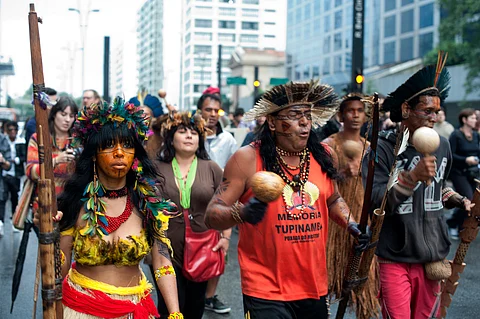

Civil society organisations and environmental defenders are instrumental in preventing biodiversity loss and nature’s decline but face violence, rights violations and inadequate support, according to a Transformative Change report published December 18, 2024 by the Intergovernmental Science-Policy Platform on Biodiversity and Ecosystem Services (IPBES).
The thematic assessment report looked at underlying causes of biodiversity loss, determinants of transformative change and options for achieving the 2050 Vision for Biodiversity. It highlighted that CSOs have mobilised citizens to take social action, held governments and the private sector accountable and initiated public debates on biodiversity.
These efforts are critical as the window to prevent further biodiversity loss is rapidly closing.
The United Nations describes environmental human rights defenders as individuals and groups who, either personally or professionally, work peacefully to safeguard and advance human rights associated with the environment, such as water, air, land, plants and animals.
The report warned that continued biodiversity loss could lead to an irreversible decline in key ecosystem functions, jeopardising human well-being and life on Earth. It linked biodiversity loss to other global crises such as climate change, pollution and water scarcity, emphasising their interconnected nature and collective impact.
If remained unaddressed or amplifying either of crises pose direct risks to humans and nature, it pointed out
“The current extent and pace of biodiversity loss and nature’s decline, combined with the magnitude of the multiple interconnected global crises, including climate change and pollution, seriously and irreversibly threatens human wellbeing and life on Earth, decreasing quality of life and leading to substantial economic costs,” the report has said.
The analysis examined 2,802 social mobilisations from 1992 to 2023, which challenged 46,955 environmental threats over biodiversity loss, soil contamination, climate change, groundwater, surface water and landscape degradation, waste overflow and deforestation. These mobilisations undermined 13 of the 23 Kunming-Montreal Global Biodiversity Framework Targets.
While 54 per cent of these actions achieved reforms — such as technical solutions, environmental improvements and compensations — nearly 27 per cent resulted in regressive outcomes, including violence against defenders and underreported and overlooked gender-based violence.
Between 2012 and 2022, over 2,000 environmental defenders, including journalists, were killed for opposing environmentally destructive activities like mining, dam construction and deforestation, the paper said.
“Environmental defenders are also subject to displacement, repression, criminalisation, harassment and digital attacks,” the report found.
Approximately 19 per cent of social mobilisations led to transformative outcomes, such as the cancellation or suspension of environmentally harmful activities. Preventive actions that combined litigation and diverse tactics proved more effective.
“Social mobilisations were more successful when they were preventive and pursued a diversity of tactics, including litigation. Supporting and amplifying civil society initiatives can help dismantle harmful practices,” the report noted.
Notably, nearly 40 per cent of these mobilisations occurred in regions identified as top conservation priorities for 1,391 species.
However, the assessment highlighted a disparity between the resources dedicated to halting transformative change and those allocated to conserving and sustainably using biodiversity. It underscored the urgent need to support and amplify civil society initiatives, as their efforts remain underappreciated despite their pivotal role in combating biodiversity loss.